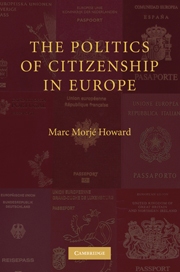Book contents
- Frontmatter
- Contents
- List of Figures
- List of Tables
- Preface
- Introduction
- PART I ARGUMENT
- PART II CASES
- 4 Liberalizing Change
- 5 Restrictive Continuity
- 6 Partial Liberalization with a Restrictive Backlash
- 7 Citizenship Battles in the Historically Liberal Countries
- 8 The New European Frontier
- Conclusion
- Appendix I Detailed Breakdown of the Three CPI Components
- Appendix II Naturalization Rates for the EU-15
- References
- Index
7 - Citizenship Battles in the Historically Liberal Countries
France, Belgium, the United Kingdom, and Ireland
Published online by Cambridge University Press: 05 June 2012
- Frontmatter
- Contents
- List of Figures
- List of Tables
- Preface
- Introduction
- PART I ARGUMENT
- PART II CASES
- 4 Liberalizing Change
- 5 Restrictive Continuity
- 6 Partial Liberalization with a Restrictive Backlash
- 7 Citizenship Battles in the Historically Liberal Countries
- 8 The New European Frontier
- Conclusion
- Appendix I Detailed Breakdown of the Three CPI Components
- Appendix II Naturalization Rates for the EU-15
- References
- Index
Summary
INTRODUCTION
As with the cross-national analysis in Chapter 3, the case study chapters in Part II of this book have thus far focused on the question of continuity and change in the eleven relatively restrictive countries within the EU-15. Indeed, this constitutes the primary empirical evaluation of the theoretical arguments developed in Chapter 3. But even though the four “historically liberal” countries – Belgium, France, Ireland, and the United Kingdom – had little room to liberalize, this does not mean that questions of citizenship were absent from the political agenda. On the contrary, perhaps because of their unusual and relatively generous traditions of granting citizenship to immigrants, citizenship remained a controversial and contentious topic in debates among both political elites and the wider population.
Since a larger goal of this book is to bring all of the countries in the EU-27 into a general comparative framework, this chapter examines the politics of citizenship in these four distinctive countries. The purpose is not to provide an exhaustive overview of the citizenship policies of each country, nor a thorough review of the secondary literature on these cases, particularly since France and the United Kingdom have already received disproportionate attention in the scholarship on citizenship. As with the previous comparative case study chapters, this chapter focuses on each of the four cases individually, before turning to some broader comparative conclusions about the politics of citizenship in the historically liberal countries.
- Type
- Chapter
- Information
- The Politics of Citizenship in Europe , pp. 148 - 168Publisher: Cambridge University PressPrint publication year: 2009



